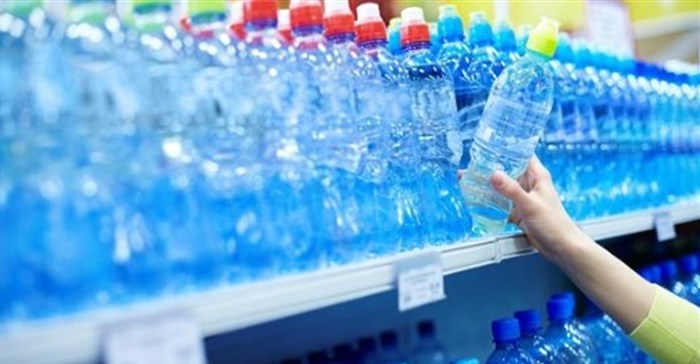Cape Town's municipal water quality is excellent. In normal times there is no good reason to buy bottled water, but these are not normal times. As Day Zero approaches - the hopefully avoided day when water no longer flows from the city's taps - many people are understandably stocking up on bottled water.

©Dmitriy Shironosov via
123RFWe sent the same set of questions to four producers of bottled water. GroundUp struggled to get answers from Clover, the manufacturer of Pure Life, but it is a member of the South African National Bottled Water Association (SANBWA), which did respond to our questions.
IMPORTANT: We haven’t fact-checked the responses we received from the companies, and we’re not making any recommendations about whether to buy bottled water, or which brands to buy. Also, if you notice that some of the responses don’t really answer our questions, you’re not alone: we noticed it too.
The companies
Peninsula Beverages
Two well-known brands, Valpre and Bonaqua, are manufactured by the Coca-Cola company, and Peninsula Beverages (PenBev) holds the rights to manufacture and distribute the products of the Coca-Cola company. PenBev’s Priscilla Urquhart responded to our questions.
Henties
Local brand, Henties, founded in 1998, is best known for their fruit juice, but they also produce still water. Founder and CEO, Hentie De Wet responded to our questions.
aQuellé
KZN-based aQuellé started in 1998. Suzelle Stegen referred questions to SANBWA, but she also answered some of our questions directly.
Pricing
With the huge increase of demand that will come as Day Zero approaches, we are worried about price gouging.
Xanthea Limberg, the Mayco member responsible for water, told GroundUp that the City has been talking to the bottling companies. She said the City would find the “most appropriate mechanism to ensure that bottled water remains affordable and available”.
We asked all the companies a precise question: Are you willing to commit to increasing the price of your product by no more than the inflation (CPIX) for the next two years? If not, is there a maximum price increase you are willing to commit to?
We also asked if the City has indeed been talking with them.
PenBev confirmed that it has spoken with the City. But this did not include pricing. On pricing, Urquhart said: “Bottled water pricing has become very competitive since the onset of the drought. We have not increased the price of our bottled water in recent times.” She said: “We will review our current pricing on bottled water in line with our product portfolio based on input costs and other economic factors influencing the manufacturing industry.”
Henties committed to not pushing up its price when Day Zero arrived.
aQuelle’s Stegen wrote: “It is difficult to predict the circumstances for the next two years as there are factors beyond our control. We have not had a price increase this year and continually look for ways to pass on savings to our consumers. Therefore our previous years’ price increases have been way below the CPIX.”
Sourcing water
Some people who buy bottled water will want to know if they are drinking from a source that does not deplete the municipal supply.
PenBev said: “All bottled water, still and sparkling that we sell, except the flavoured water which we manufacture locally, is produced outside of the Western Cape and transported to our depots in Cape Town.”
SANBWA has published a statement saying that its members’ “water sources are independent of other water users, thus the impact on South Africa’s groundwater resource is nil. Since no water from any of these sources enters the municipal system, the fact that these sources are used for bottled water has no impact at all on the amount of water South Africa’s municipalities.”
Henties sources its water from a farm in Worcester. De Wet said his company would transport water from the farm to Cape Town if the city’s water runs out.
Storage
The companies gave similar answers about how long their water could be stored. Their bottles have a best-before date, but drinking water could be kept for about a year, they said, if stored in a cool place away from sunlight.
But does bottled water become dangerous to drink if left too long? Interestingly according to the International Bottled Water Association, the US Food and Drug Administration (FDA) “has determined that there is no limit to the shelf life of bottled water". Consequently, the FDA does not require an expiration date for bottled water products.
Recycling
If you take a look at the shores of some of Cape Town’s wetlands, like Zandvlei for example, you can see one of the problems caused by discarded plastic bottles. With a massive uptake in bottled water that would come with Day Zero we asked the companies: “As the crisis deepens, more people will buy bottled water, substantially increasing the amount of plastic waste. What measures are you taking to assist with this? Do you recycle your bottles? Can consumers or retailers easily get their used bottles back to your company?”
PenBev said all of its plastic bottles were 100 percent recyclable and their 1,5 litre and glass bottles were produced in a returnable pack size. Consumers can take them back to the place they purchased them from and redeem a deposit.
Henties replied that used bottles could be placed in the City’s green recycling bins. De Wet said this was a system that worked well.
SANBWA sent a detailed answer on recycling. This is its essence: It said that PETCO, the organisation responsible for recycling plastic bottles claimed a recycling rate of 55% in 2016, almost the same as the European rate of 59% and much higher than the US rate of 30%. “As an organisation, SANBWA was among the first worldwide to require its members to follow PETCO’s recycling guidelines.”








































